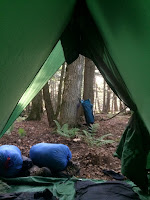Today in Birdland it's sunny and cool. Clouds bounce in a blue sky and Black-Eyed Susans nod with the breezes that blow through the yard. The beans have set on, and the wind ripples the lovely green fields. All this belies the urgency our planet is under.
A few years ago, while we were backpacking in the
Cascades, some wildfires were burning in British Columbia. You might think
fires one hundred-fifty miles or more away would be of no consequence to a
couple of hikers at Dorothy Lake, but this is when we discovered first-hand
that smoke doesn't recognize international borders. Each day on the trail was a
little hazier. By the third day, the pristine forest of pines across the lake was
heavily blurred by
the smoke, and we could smell it in the air. I worried a lot
then, not so much about escaping a forest fire, since we were camped on the
shore of a large body of water, but about the effects of the smoke on Michael's
lungs. My husband is prone to allergies, and I could tell the dense air was
getting to him.
 |
| Camping in the Cascades |
As I write this, we hear news that our planet is
burning on both ends. USA today reports that Arctic wildfires are made more
serious because of hotter summer temperatures. They have now ignited the layers
of peat in the ground in some places. This is grim because, unlike a wood fire
that burns quickly through its fuel, peat (which is accumulated layers of partly
decayed vegetable matter—coal before it becomes coal) smolders for days, weeks,
or months, and releases a lot of stored carbon, creating a terrible cycle (more
greenhouse gasses à more trapped heat à
more fires). The International Union for the Conservation of Nature tells us
that peatlands are one of our most valuable planetary ecosystems, and one of
the most efficient ways the planet stores carbon. They cite lack of awareness
of the importance of peatlands as leading to damage and overexploitation
(drainage of peat bogs, conversion to agricultural lands, burning for fuel).
And now Arctic peatlands are on fire.
 |
| Tiny Toad on Birdland Pond |
In the Southern Hemisphere, the Amazon Rainforest is
burning. Is it a cliché to say that the Amazon Rainforest makes up the lungs or
our planet? We know that oxygen comes from plants, and the plants in the Amazon
Rainforest are gigantic factories of oxygen, since they don't have to shut down
for winter like we do here in Birdland. If one of our biggest producers of the
air we breathe are in trouble, so are we. Reuters reports that a record number
of fires are burning in the Amazon (over 73,000, and 83% more than last year). CNN
reports that many of these fires are intentionally set by ranchers and loggers
to clear land for raising cattle, which shows that our consumption of beef is
specifically linked to this butchery of one of our most important planetary
resources. Honestly, it frightens me, but we need to be responsible with our fears.
If our fears let us throw up our hands and say, “Oh well, if the world is going
to burn, what difference does my little carbon footprint make? I’ll go ahead
and order that double cheeseburger,” then we are being very selfish. We can
choose to turn our fears inside-out like a sock to find hopes and use them to
take positive action.
On the scale of the Arctic and the Amazon rainforest,
our individual actions might not seem to matter much, so why not add them
together by supporting groups that can actually make a difference? CBS News
gives us a list of organizations that Charity Navigator rates highly based on
"financial health, transparency and accountability." They are
amazonteam.org, amazonconservation.org, rainforesttrust.org, rainforestfoundation.org.
The World Economic Forum lists ways we can help conserve the polar ice in the
Arctic at
Three Ways You Can Save Arctic Ice. Please
join me in checking out these sites to educate ourselves on these climate
disasters. When the Notre-Dame Cathedral caught fire, the world stepped up to
donate money. Let's do the same for these burning ecosystems. The bees and the
birds and the bouncing Susans of Birdland will thank us.
Gather
in Beauty; Support Peace; Blessed Be









No comments:
Post a Comment